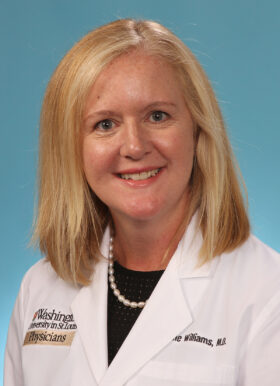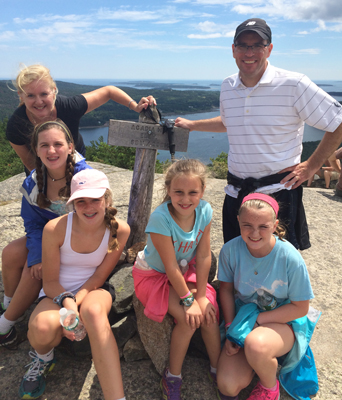Kristine Williams, MD, MPH

Kristine Williams, MD, MPH, is a pediatric primary care specialist, with 15 years’ experience in pediatric emergency medicine.
Dr. Williams is accepting new patients. Her practice, University Pediatric Associates, is located at:
- St. Louis Children’s Specialty Care Center, 13001 North Outer Forty, Suite 310, Town & Country, Missouri 63017
Please call 314-454-6400 for an appointment.
What happened in the course of schooling to influence you to choose your specialty?
My interest in pediatrics goes way back. My father is a pediatric neurologist, so from a very early age I was exposed to medicine. I always loved being with kids and knew pediatric medicine was the direction I wanted to go during medical school and residency.
My fellowship was in pediatric emergency medicine and I continued in that sub-specialty for about 15 years. It was a great time of my career because I loved taking care of kids with serious illnesses. I’m a problem-solver type of person and it was a perfect fit for me.
Now I get to come back full circle to where my interest first started – caring for kids long-term. I enjoy developing relationships with children and their families. It’s been a very interesting and rewarding transition.

How does your emergency medicine background help you now?
Because of my experience in the emergency room, there are a lot of conditions (asthma flares, injuries, concussions, lacerations, minor broken bones, sprains) that can be managed in the office – saving a trip to the hospital.
Obviously, if it’s apparent the child needs more care than I can give in my office, I wouldn’t hesitate to send him or her to the emergency department. But I do feel very comfortable with a broad spectrum of complaints.
It will also be very convenient for families after we move to our new location in the St. Louis Children’s Specialty Care Center in early 2016 (13001 North Outer Forty, Chesterfield, MO). “One-stop shopping” will be comforting to parents for the health care needs for their children – radiology, lab testing, pharmacy and many sub-specialists all in the same location.
What brought you to Washington University?
I attended Georgetown University for my undergraduate and medical degrees. When searching for a residency program, I initially looked at a lot of programs on the East coast. But then my father suggested I consider Washington University. I loved everybody I met here and it turned out to be a fantastic decision – it affected the rest of my life.
At the time, Dr. James Keating was the director the pediatric residency program at St. Louis Children’s Hospital — he and my father were friends and had been in training together. Another dear friend of my father’s, Dr. Phil Dodge, (well-known as one of the modern founders of pediatric neurology), was also here.
Dr. Keating and Dr. Dodge were very influential and helpful during my training; they made sure I was comfortable here. Dr. Keating was known for making sure that no resident left the program without being fully prepared. You couldn’t escape unless you were ready!
Which part of your transition to primary care medicine is most interesting?
The most interesting part of my transition from the pediatric emergency department to the primary care world is getting to do the day-to-day things I wasn’t doing before.
I enjoy the well-child checks and well-baby checks and seeing the progression as my patients grow. I’ve seen it in my own children, but watching the development of someone else’s children has been really fascinating.
I love answering parent’s questions, especially new parents who don’t have any experience with an infant. I reassure them and say “I asked those same questions, and thought I should have known all of the answers since I am a pediatrician, but I didn’t at the time.”
It’s been very interesting and fun.
Are there new developments in your field you are excited about?
I believe that the continued development of vaccines to help prevent childhood illnesses that are associated with significant morbidity and mortality is one of the most important ongoing achievements in pediatrics.
I am very pleased to see the beginnings of a shift in the renewed public recognition of the importance of immunizations.
Pediatricians are starting to have more families inquire about the policies towards immunizations in their practices. Parents want to make sure they are taking their children to a place where other children are also immunized.
Another encouraging development is establishing the pediatrician’s office as the medical home for children with chronic medical conditions. This allows me, as the pediatrician, to have interaction and communication with the child’s sub-specialists. This is very helpful when the child comes in to see me for an office visit, because I know what has been going on since the last time I saw him or her.
Was the fear of autism the main reason people were afraid to get their children immunized?
There are likely several different reasons that parents refuse vaccinations for their children, but the fear of autism has certainly been a significant one.
Multiple studies have shown there is no link between autism and vaccines or the preservatives in vaccines. The study published in Lancet in 1998 that originally linked autism to the MMR vaccine was based on false information and has been completely debunked.
The public perception about a link between vaccines and autism has been unfortunate and very damaging. Recently, we have seen the effects of not vaccinating in the outbreak of measles which is likely due to substandard vaccine compliance and its effect on infants and children who are too young to receive the vaccine.
The scientific evidence is clear that vaccines and the recommended vaccine schedules are safe and effective.
Where are you from?
I was born in Boston, Massachusetts; grew up in Durham, North Carolina and Memphis, Tennessee, then moved to Washington DC for undergraduate and medical school at Georgetown.
After I graduated from college, I spent a year working in Italy. Georgetown has a villa in Fiesole where undergraduate students can live while they are taking classes. I lived in the villa as a resident assistant with the students for a year. It was a wonderful year and I grew a lot as a person. I often think about how fortunate I was to have that experience.
Is there a particular award or achievement that is most gratifying?
It was an honor being chosen pediatric chief resident. While it was a very challenging year, it was a great learning experience. Along with my two wonderful co-chiefs, we supervised the residents, set their schedules and managed problems. We did all the phone level triage, managed all the phone calls for patient transport, and actually assigned hospital beds. It’s a different system now.
We were also heavily involved in administrative tasks – sitting in on different committees within the hospital, interviewing new resident applicants and reviewing the current residents. It was a major course in management that was pivotal to the way I deal with people now.
What is the best advice you’ve received?
No matter how big your problem is, get a good night’s sleep and most things are clearer in the morning. It’s the advice I now give to my own children.
Also, you need to have hobbies you love outside of work. That is really important to making you an interesting and happy person.
What hobbies do you have?
I like to exercise, play golf, cook, and I love to read. I also really like to sew, but nobody will wear the clothes I sew anymore — not even my 8-year-old! We also do a lot of family activities together and we love to travel.
If you weren’t a doctor, what would you like to be doing?
I would still do something with kids — I would probably be a teacher.